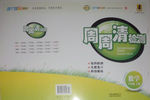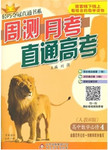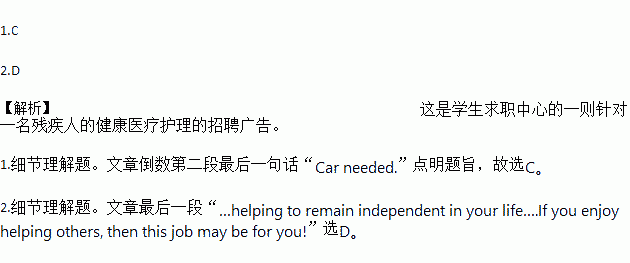题目内容
Student Job Center
Job #: 45961 | |
Employer: MJ Homecare | On Bus line: No |
Pay: $12.50-$16.00/hr | Posted: 05/26/2017 |
Category: Health Care-Medical | Deadline: 07/04/2017 |
Number of Positions: 3 | |
Contact Information: Name: MJ Ford Email Address: wiscwiscwisc@gmail.com Address: Verona, Wisconsin 23333 Primary Phone: 623-623-2333 | |
Description: Outgoing, fun, disabled man on Madison’s far west side has immediate need for assistance with morning and/or evening cares. Times are somewhat flexible. Morning duties (8 AM) include transferring, assistance dressing, bathing, bowel care (肠道护理) and other activities associated with morning routine for the disabled. Short evening shift duties include help with bedtime, usually between 8-9 PM. Apply for either shift. Lifting is a vital part of this job. Experience with manual, pivot-type transfer and bowel care is preferred, but will train. Additional information is available upon request. Pays $12.50+/hr. Car needed. This position is great experience for anyone interested in a career in the medical field—nurse, PA, doctor, occupational therapy, physical therapy, etc., but not limited to those areas of interest. A very rewarding position that makes a difference, helping to remain independent in your life. If you enjoy helping others, then this job may be for you! Please respond by email and include your phone #. https://jobcenter.wisc.edu/jobs/detail/45961 | |
1.If you successfully land the job, it is better for you to ________ there.
A. ride a bus B. take a train
C. drive a car D. travel on foot
2.This job is targeted at those somewhat strong students ________.
A. who are experienced and available for both shifts
B. who are outgoing and good at caring skills
C. who are determined to get jobs in the medical field
D. who are caring and ready to live on their own
 周周清检测系列答案
周周清检测系列答案 轻巧夺冠周测月考直通高考系列答案
轻巧夺冠周测月考直通高考系列答案

 day years ago when they had first met. “Do you ____ wonder why I was carrying so many things home that day?” asked Bill. “You see, I ____ out my locker because I didn’t want to leave a mess(脏乱) ____ anyone else. I had planned to run away and I was going home to ____ my things. But after we spent some time together ____ and laughing, I realized that ____ I had done that, I would have ____ a new friend and missed all the fun we would have together. So you see, Mark, when you picked up my books that day, you did a lot more. You___ my life.”
day years ago when they had first met. “Do you ____ wonder why I was carrying so many things home that day?” asked Bill. “You see, I ____ out my locker because I didn’t want to leave a mess(脏乱) ____ anyone else. I had planned to run away and I was going home to ____ my things. But after we spent some time together ____ and laughing, I realized that ____ I had done that, I would have ____ a new friend and missed all the fun we would have together. So you see, Mark, when you picked up my books that day, you did a lot more. You___ my life.”